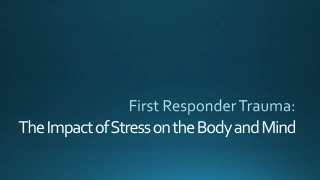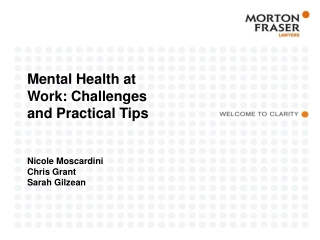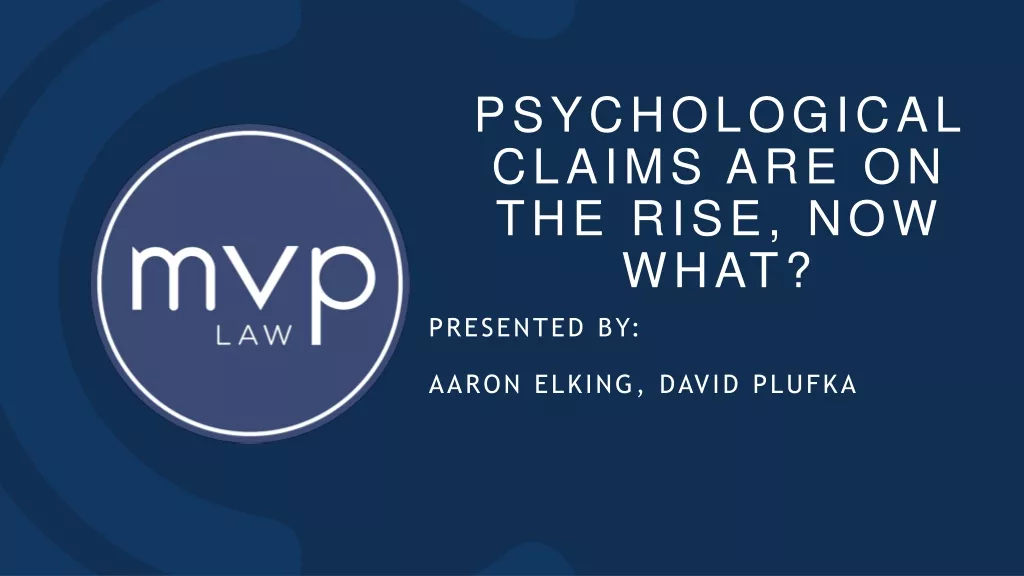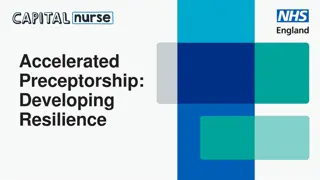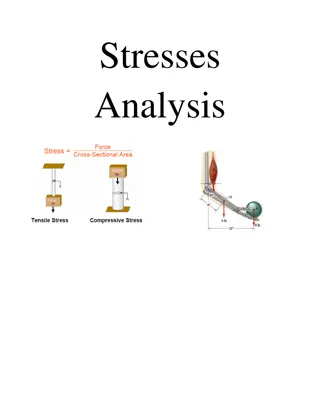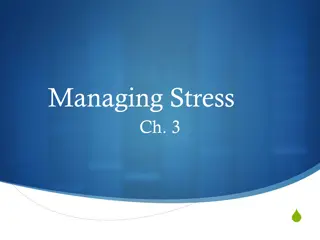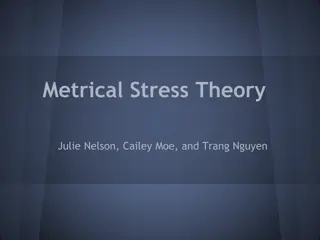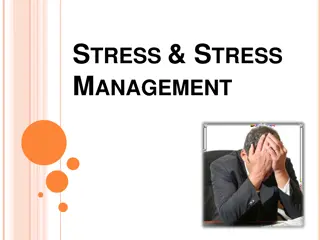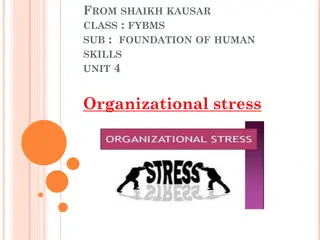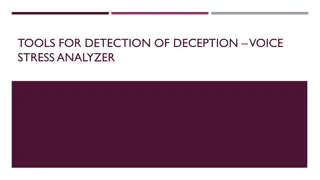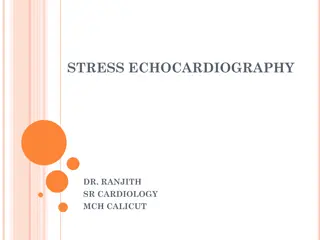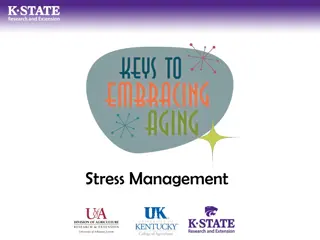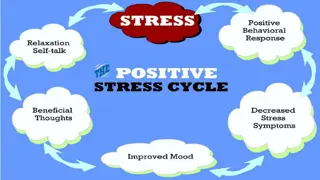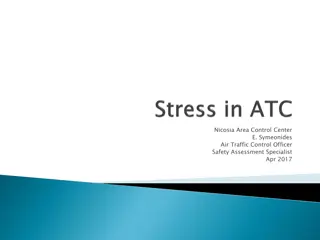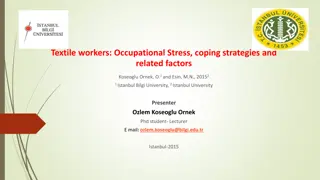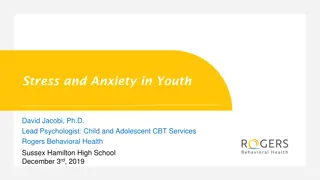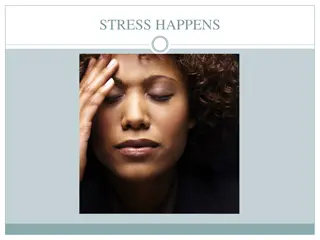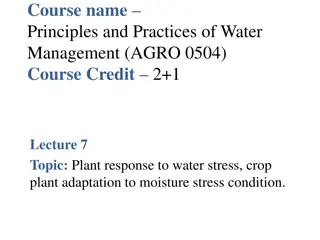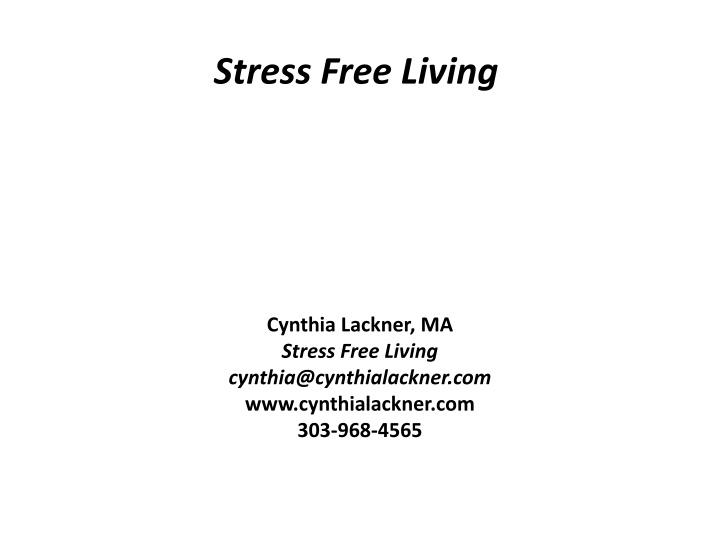
Stress: Impact on Mental Health and Society
Explore the effects of stress on mental health and society, with insights on common stressors and their implications. Learn how to identify stress-induced symptoms and take proactive steps towards a healthier, balanced lifestyle.
Download Presentation

Please find below an Image/Link to download the presentation.
The content on the website is provided AS IS for your information and personal use only. It may not be sold, licensed, or shared on other websites without obtaining consent from the author. If you encounter any issues during the download, it is possible that the publisher has removed the file from their server.
You are allowed to download the files provided on this website for personal or commercial use, subject to the condition that they are used lawfully. All files are the property of their respective owners.
The content on the website is provided AS IS for your information and personal use only. It may not be sold, licensed, or shared on other websites without obtaining consent from the author.
E N D
Presentation Transcript
Stress Free Living Cynthia Lackner, MA Stress Free Living cynthia@cynthialackner.com www.cynthialackner.com 303-968-4565
Stress Free Living What does stress actually do to you? What can you do about it?
You might be performing at a high level of excellence, so you are most likely unaware of how you are not in balance but in stress. You could be functioning and at the same time, completely numb.
According to the World Health Organization, the United States is the most anxious country on the planet. More than 40 million people currently live with a diagnosis of ANXIETY. Generalized anxiety disorder affects 6.8 million adults or 3.1% of the US population. Women are twice as likely to be affected as men. Panic disorder affects 6 million adults or 2.7% of the US population. Women are twice as likely to be affected as men.
On the next two slides: Notice which statements might be true for you (which are stress induced)
___Death of a loved one ___Recently moved ___Divorce of parents ___Encounter with the legal system ___ New school/job after school ___ New romantic relationship ___Serious argument with close friend ___ Increase in course load or difficulty ___ Change in health of family member ___ Failed important course ___Major personal injury or illness ___ Managing learning or other disabilities ___ Change in living conditions ___ Argument with instructor ___Change in social life ___Stress around social media
__ Change in sleeping habits ___ Lower grades than expected ___ Breakup of relationship ___ Financial problems you are aware of ___ Change in eating habits ___ Too many missed classes/ sick days ___ Long commute to school ___Working more than one job ___ Argument with family member
Emotions We Feel In Our Body grief fear anger shame sadness vulnerability disappointment
Brain States To figure out what brain state you are in, I am going to ask you about how you have been doing with your stress over the last month. You will give yourself a number corresponding to how you are doing. In the last month-How often have you felt these different brain states? Brain State 1 Feeling great-feeling balanced and rewarded with surges of pleasure in your body 0-Rarely 1-Sometimes 2-Often 3 Very Often Brain State 2 Feeling good being present and aware of your balanced positive and negative feelings 0-Rarely 1-Sometimes 2-Often 3 Very Often Brain State 3 A little stressed-feeling mainly negative feelings being somewhat numb and thinking too much 3 Rarely 2-Sometimes 1-Often 0 Very Often Brain State 4 Definitely stressed- Feeling negative, unbalanced, feelings having expectations that are too harsh. 3= Rarely 2 Sometimes 1= often 0= very often Brain State 5 Stressed out-overwhelmed confused, lost or disconnected 3-Rarely 2 Sometimes 1=often 0= Very Often Total up your number. The higher the score, the better you re feeling
The Brain Map Brain Set Point The brain set point is determined by experience. The more we are in a particular brain state, the more the brain develops the habit of being in that brain state. Describe the habit ( set point ). 1=feeling great 2=feeling good 3=a little stressed 4=definitely stressed 5=stressed out. Current Set Point: 1 2 3 4 5 Father s Set Point 1 2 3 4 5 Mother s Set Point 1 2 3 4 5 Early Set Point (age 3) 1 2 3 4 5 Childhood Set Point (age 8) 1 2 3 4 5 Adolescent Set Point (age 14) 1 2 3 4 5
Neocortical Brain The neocortical (thinking) brain is the overseer of the emotional brain. Stress causes difficulties with attention and thinking. Attention Thinking flexible rigid reactive chaotic excellent good satisfactory poor Emotional Brain Self-regulation How we respond to stress, is transmitted by the parent downloaded to the child. Circle what best describes your early relationships. Parenting Style: authoritative permissive authoritarian neglectful Attachment Style: secure insecure (tend to merge or distance)
Stress Circuits Which of these circuits (expectations) is stronger (rings true) for you when you go into stress (that black and white thinking)? Existence I do not exist Essence I am bad Power I have no power Purpose I cannot do good Love I cannot love Desire I am not worthy Wisdom I cannot have joy I am not bad. I do have power I can do good. I can love I am worthy I have joy! I do exist
Survival Circuits When you are stressed (fearful or numb) which patterns (behavior, emotion or relationship) bring you safety or comfort? Behavioral: food smoking alcohol drugs gambling spending Internet/Television exercise staying busy fantasy sexual excesses sleeping hoarding over thinking over working Emotional: hostility depression anxiety panic shame numbness mania false high Relational: distancing merging both distancing and merging Intimacy Blockers When you are stressed (fearful or numb) which patterns do you use to block intimacy? Circle all that apply. Role: The good one The bad one The perfect one The smart one The dumb one The bully The victim The boss The success The failure The invisible one The vulnerable one Interaction: interrupting bragging disappearing judging criticizing lying joking too much pretending to listen tuning out mindless talking non-stop talking placating sarcasm complaining hysterics overanalyzing stomping off Hurts: trauma (emotional physical sexual other) cluster of hurts adversity insufficiency, (grew up with minimal emotional pain).
Body Health Problems____________________________________________________________________ Medications____________________________________________________________________________ Lifestyle food: % of diet unrefined foods (e.g., fruits, vegetables, healthy fats, protein) <60 60-80 80+ exercise: 0 100 200 300+ min/week sleep: 7 or less 8 9 or more hours/day Top 3 sources of Joy 1________________ 2___________________ 3_________________
Stress The root cause of addiction is stress. It starts early in life, as the wiring of how to self-regulate is transmitted from one generation to the next during the first 3 years of life.
Are you an Emotional Eater when dealing with stress? Do you eat comfort foods to celebrate something good in your life? Do you eat when you are frustrated, angry, sad, lonely, tired, bored, full, afraid?
Stress and Self-Control impact burnout Test the theory about how being worried or overworked affect the choices you make. Does being hungry or tired drain your willpower? What about physical pain, illness or emotions like anger, loneliness, or sadness? Do they seep into your consciousness? Notice when stress strikes throughout the day or week. Then watch what happens to your self-control. Do you experience cravings? Lose your temper? Put off things you know you should do?
Strong emotions that are not processed thoroughly, are stored in cells. If your feelings are blocked, denied and repressed, the blood flow can become chronically constricted depriving organs of nourishment. This leaves you foggy, less alert and with limited awareness.
There are 5 basic skills and tools to learn to diminish stress. The first one is called Damage Control
Brain State 5 The reptilian brain How do I know I am in this brain state? I am stressed out Either my body hurts or I am numb Overwhelmed Lost Confused Strong Cravings Time Warp Some people can see brain states in others more easily , than they can see in themselves!
Do Not Judge, (myself or others) Minimize Harm (not reaching for external solutions) Know It Will Pass- (it is a brain wire)
Brain State 4: Definitely Stressed How do I know I am in this Brain State? *Emotions are ramped up *Feelings may shut down *Tension or fatigue *Body pain
Best bet to Identify-Distancing or merging from others Too Harsh Inner- Voice-Self Criticism Intense Negative Feelings What is good about this Brain State? Most effective state for rewiring stress circuits for moving up the Brain state Trains the brain for hope and power
Cycles Just the Facts List 3 or four short, choppy, sentences that are facts not feelings
I am angry that I am sad that I am afraid that I am guilty that
The Natural Flow of Feelings Anger Sadness Fear Guilt This is a natural process and one feeling melts into the next. Often after three statements of a particular feeling, you become aware of the next feeling. It helps to use very short statements, with strong feelings rather than think them.
It is our (unmet) expectations that keeps us upset What is my unreasonable expectation? What unreasonable expectation is fueling my stress? The wire is an unconscious unreasonable expectation such as: I must be perfect. I must be in complete control. Whatever I do, it won t work out. I am a bad person. I don t matter.
Grind Ins Positive Powerful Thought Set a Limit
Brain State 3 Emotional Housecleaning How Do I Know I am in this Brain State? Best Way to Identify A little stressed Slightly numb Irritable A little negative Somewhat anxious Thinking too much
At the tipping point Using the tools now Prevents overreaction Somewhat functional What is great about this state:
Emotional Housecleaning I m angry that I m sad that I m afraid that I m guilty that Essential Pain
Emotional Housecleaning (cont.) I m Grateful That I m Happy That I m Secure That I m Proud That Earned Rewards
Brain State 2: Feeling Good In General: Feel Good Balanced Present Body Feel Aware of feelings Emotions are balanced Highly functional Best Way to Identify What s great about this state: Strengthens joy circuits Easy to maintain
Brain State 1: Feeling Great! In General: Feeling Great! Best Bet to Identify: Peaceful Compassionate Complete What s great about this state: Breaks stress circuits Strengthens joy circuits Decreases cravings Optimal for health
This presentation is an overview regarding what you can do when triggered with stress throughout the day. This talk has been about awareness that these skills and tools exist. This is a beginning step, not an end. You could learn these skills and have them for life! If you have questions or concerns, please feel free to contact me. My email address is cynthia@cynthialackner .com Cynthia Lackner, MA Stress Free Living 303-968-4565 www.cynthialackner.com
It is not difficult to learn the skills and tools of EBT It is difficult to live with stress.
Stress Free Living Cynthia Lackner, MA cynthia@cynthialackner.com Stress Free Living www.cynthialackner.com 303-968-4565

